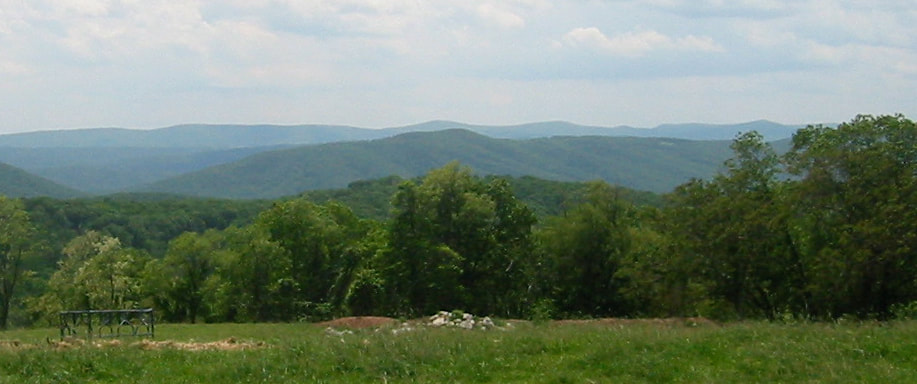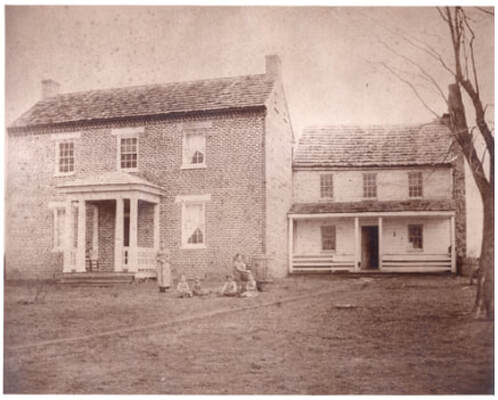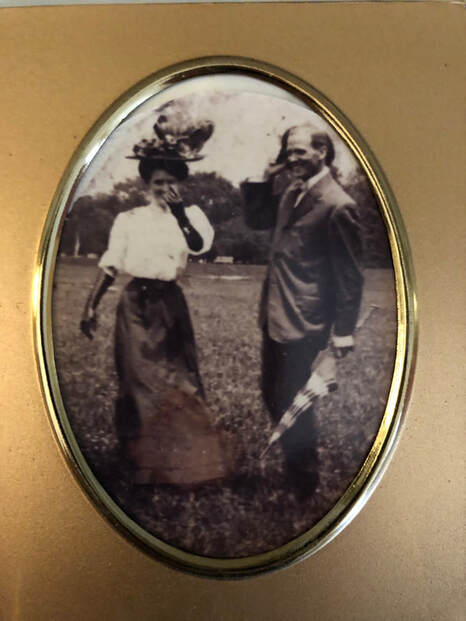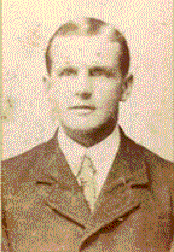 Lorenzo Lee Bean, ca. 1900 Lorenzo Lee Bean, ca. 1900 First, get yourself a mountain. Then put a house on it - perhaps a spot where you can see five counties and every mountain around it for miles around - ideal for seeing the approach of Indians long long ago, or troops during the Civil War... which brings us to the history of a Mountain Man and his wartime “adventures” - taken straight from our Hardy County, West Virginia Family History. David Ferguson Bean was born November 19, 1842 in the town of Fabius, surrounded by the steep, tall hills of Hardy County, David was the son of Margaret Anderson and George Bean (1), and was the first of their nine children to actually make it to adulthood. Just in time to try and get himself killed in America's Civil War. The Beans of Hardy County were Virginians before 1862 and West Virginians after 1862, whether they liked it or not. The state line was drawn without asking their opinion on the matter. Whether they owned slaves is still unknown, but is highly likely (2), Regardless it's certain the family didn't take to President Lincoln and the Union. In 1861, David had "jined up" with the Confederate Army and become a cavalryman in McNeill's Rangers. Like Col. John Singleton Mosby's Rangers, McNeill's Rangers was formed to conduct raids on Union supply trains and outposts. John Hanson ("Hanse") McNeill was well-known and, among Confederates, well-respected. David's obituary tells us, "He was with the famous McNeill Rangers, whose swift dashes created terror along the Mason and Dixon line" (3). Hanse formed McNeill's Rangers in 1862, and the troop eventually numbered around 200. In 1863, David's father moved the rest of the family into a ca. 1820 Federal brick house on the top of a tall hill (4). The house of Flemish Bond brick was modest but the rooms commodious, and there was a large clapboard addition that held a kitchen with a wide stone fireplace. David was a man of small stature, "an advantage many times in making his numerous escapes." He came home to the mountain on leave once, and word slipped out to the federal troops nearby. They surrounded the house on the sly, trapping 21-year old David inside. As they came in the house, David kept his cool. He "sat down in front of the fireplace, pulled an old cap down over his head, [and] picked up a little [india] rubber ball." He started bouncing it and just "kept bouncing it around while the soldiers searched for someone who 'looked' like an enemy soldier" (5). And David remained free to fight another day. In the spring of 1864, an argument had erupted in Richmond over whether to allow these ranger troops, "Partisan Soldiers," to continue. A number of questionable acts had been committed (think Jesse James), and the Confederacy wanted to clean things up. But even legitimate raiders did unpleasant things to try to win an un-winnable war. David's son, L.L., once told his own son he'd traced his lineage back to a horse thief - the worst epithet one could give a man back then - and decided he didn't want to know more. Could be he was speaking of his father, as Confederates were known to steal horses (see 1864 Richmond argument). Col. John Singleton Mosby accepted the name, but blithely added, "all the horses I had stolen had riders, and the riders had sabers, carbines and pistols."(6) Between November '63 and April '64, David Bean switched his enlistment to the 18th Virginia Cavalry: could be he didn't like McNeill's tactics or worried his troop would be dissolved (But in fact, by 1865 McNeill's and Mosby's Rangers were they only "irregular" troops still recognized by the Confederacy). On the other hand, it might be David just wanted to be with family: there were thirteen Beans in the 18th Virginia, and only one other Bean in McNeill's Rangers. In any case, he made the switch but by September 30, 1864, he's listed as absent. Yet his obituary says he served four years in the Confederate Army and the Confederate Service Cross on his grave says 1861-1865," so perhaps he went home to help with the harvest, as was the habit of many a farmer/soldier. Of course in April 1865, the war finally ended, and David went back to his father's farm to work.. He was still there in 1870, when the census listed George, 64, as "farmer," his wife, Margaret, 46, as "Keep house," 27 year-old David as "Farm Labor" along with younger brother, Malon, 20. Also at home on the mountain were Emily 16, Ann 15, and Simon 11 (Talk about your mountain man: after Simon grew up and took over the George Bean property, the mountain came to be named after him). Now, in the same area there lived an 18-year old named Jemima Susan Heltzel who came from an interesting family. Her grandfather, John Charles Heltzel (1792-1866), emigrated from Germany to settle with his wife, Magdalene Grandstoff, in Trout Run Valley, Virginia - which eventually became Hardy County, West Virginia. "He made his living by tinning and firing iron ore furnaces" (7). John Charles also "forged" a nice little family of 12 - five girls and seven boys, one of which was John C. Heltzel, Jr., Jemima's father. John, Jr. grew to a whopping six foot, six inches tall, earning the nickname "King Heltzel." He married Leah Myers and they had five children, the oldest of which was Jemima. Jemima was 3 years old and David 19 when the Civil War began (8). Quite a stretch for a couple, until you note how many May-December marriages are listed in the census back then. David's own parents had a 15 or 16-year age difference. The Heltzels were Lutheran, and David Ferguson Bean had "united with the Lutheran faith in early manhood" (9), so the families probably attended the same services. Later in life Jemima was credited with founding a Lutheran Church there (Missouri Synod), and David's obituary says "He was a consistent member of the Evangelical Lutheran Church." In 1873 he married Jemima, and "they lived at the old brick house near Beans Settlement once called 'Coburn's Knob' "(10). By 1874, David and Jemima had a daughter, Cora Dell. Then came Leona Frances in 1876, Lorenzo Lee in 1880, Seymour (1883), Calvin (1884), and Minnie (1900). Seymour and Calvin didn't make it past toddler-hood, so L.L. became their only son. 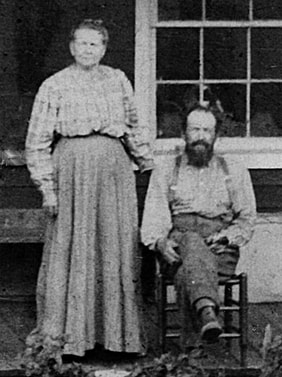 David Ferguson Bean and Jemima Heltzel Bean (Photo thanks to Dave Park) David Ferguson Bean and Jemima Heltzel Bean (Photo thanks to Dave Park) It was said when their son, L.L., was born, David looked around their log cabin for inspiration and found a history of the Medici family, and chose the name Lorenzo Lee. But it turns out Lorenzo was an extremely popular name in Hardy County. A lot of Lorenzos are listed in the roster of McNeill's Rangers and the 18th Virginia. Could be David named his son after a fellow-veteran of "the late war." Could be "Lee" was added in honor of his favorite General. Or could be there was a very successful "Medici Family" book salesman thereabouts. In any case, their little boy, Lorenzo Lee, was a beautiful child with blonde hair and clear, blue eyes. Lots of German there, and like his father, L.L. was raised to be a farmer. I once asked David's granddaughter, Elizabeth (Libba) Bean Savels, what David Ferguson Bean raised on the farm, "Chickens?" I asked. "Apples!" she replied. "Oh, he had an orchard? He sold apples?" "Lord, no, child," she laughed. "Granddaddy sold Applejack!" Farming life was hard. The hills are so steep there, the old joke goes, that for cows to stand up straight, their legs have to grow longer "on one side than t'other"! Fact is, running an Applejack still and selling hooch would not be an unusual choice - especially if you wanted to improve your prospects in the mountains. At an appropriate young age, L.L. began to attend school: a one-room, clapboard schoolhouse was all the way at the bottom of the mountain. It was quite a walk, and it was hard on young L.L.'s constitution. Over time, he became weaker than the other boys at school, and, as a matter of course, started getting beat up on a regular basis. SEE THE FACEBOOK PHOTO ALBUM OF SIMON BEAN MOUNTAIN AND THE HELTZELS At around age 12, Jemima Heltzel Bean decided if she kept sending L.L. down the mountain, the day might come he never made it back up. So she decided to keep him home to work on the farm for a year. She picked the right age to try to grow that Bean, because he had a "King Heltzel" sprout that year - all the way up to six feet tall, and now he towered over his father. To give you some idea of the kind of work he might have done that year, Elizabeth Heltzel Walters (a descendent of King Heltzel), recorded her years growing up on the farm in the 1920s: "By today's standards, people would think we were deprived when I was growing up. We lived on the farm in the same area as "King Heltzel" once lived. We had water in the house, we were one of the few that had a car, but best of all we had an ice house. We had a large building with sawdust between the walls for insulation. My father and Uncle Willie would go to the river and saw ice, about 18-20 inches thick, and haul it back, cover it with layers of sawdust, and as we needed it in the summer we would keep ice water in the house. Drippings came down in a milk trough and kept milk, cream and butter cold. But best of all we had a big freezer full of ice cream every weekend." Yep. Hauling ice and a few other like chores would do it. L.L. grew strong as an ox. And when his mother let him go back to school that fall, Lee systematically beat up every-son-of-a-farmer who'd ever laid a hand on him. Perhaps it was then young Lee realized he wasn't going to stick around Hardy County, because the same boys he'd beat to pulps would have been fellow-farmers - the ones who were supposed to come over and rebuild your barn after a disaster. Not likely. Add this to the fact that his father sold Apple Jack, and his mother was a straight up Lutheran who helped found one of the churches in the valley, and you can understand why L.L. might have decided to leave the hills. Less confusion all around. But L.L. did have some friends at school. This we know because great-grand daughter, Virginia Bean Hylton, said the lack of masculine conversation at home caused L.L. to develop an interesting habit: he took his lunch to school but ate it only on the way back up the mountain at the end of the school day. That way he could spend the entire lunch break talking to his friends. And he had some unusual friends. At some point, Hardy County saw railroad tracks laid through the mountains above Moorefield, West Virginia. One of L.L.'s buddies was a man of few words, but his pronouncements -when they finally rose to the surface - were thoughtful and profound. So when the railroad tracks were done, and the train was about to make its first run, L.L. walked his friend up the mountain and stood with him near a train tunnel - just waiting to hear his first opinion. The train came roaring through the tunnel and whipped past them. His friend remained silent. L.L. finally had to prod him, "So, what'd you think?" His friend began to shake his head slowly. "That thing shore' would 'a made a mess if it'd come through sideways." When it came time for L.L. to move forward with his life, he settled on the idea of attending a Moorefield, West Virginia Business School. But first he'd have to raise the money. Stereoscopes were all the rage at the turn of the century: hand-held picture viewers that interpreted side-by-side photos into a three-dimensional image when you looked through the binocular-like device. 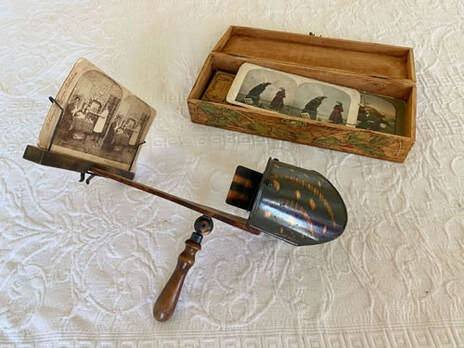 So when he wasn't farming for the family, L.L. walked up and down the steep hills of Hardy County selling stereoscopes. But sales were slow. Then one day he came upon a farmer who'd broken his leg. The farmer looked L.L. over and said, "I don't need one of those, son; what I need is someone to bring in my hay!" "Sorry I can't help you, sir. I'm just looking to make the money to attend business school." "How much you need?" When L.L told him, the farmer said, "I'll give you that if you'll bring in my hay." So L.L. stopped selling stereoscopes, brought in the man's hay and headed off to a business school . In the West Virginia school, he learned bookkeeping and used it to pay his way until his graduation. At that time, he was the youngest student ever to graduate. Eventually he also gained a degree from Eastern College in Front Royal, Virginia. And, it may seem odd to us, but all his studies led him to become the Principal of a large school. And, from my perspective, it was a very good thing. Among the staff was a young lady who was in her second year of teaching the second grade. Her name was Adelaide, five years L.L.'s junior. Adelaide Wingfield Dortch was a proper young lady who'd been born at "Oak shades" (the family home place) in Meredithville, Brunswick County, Virginia. The town was named after Adelaide's relations, in fact. She was raised in Lawrenceville, Virginia and graduated from Blackstone Women's Seminary in Blackstone, Virginia. In those days, a starting teacher taught the younger classes, and was promoted up the grades upon merit. Well, L.L. soon fell in love with her and asked her to marry him. But a teacher had to quit teaching in order to marry in those days, and that Adelaide would not do. She loved her job. So she said no. Several times. At the end of the school year, Adelaide came to L.L. with the list of students that would be graduated to third grade. L.L. looked the names over and found one of particular interest: a boy who was an absolute terror. Adelaide had already taught the little hellion two years in a row, and now, although she knew she shouldn't, Adelaide was ready to send him up the ladder. L.L. smiled and placed the list before him on the desk. "I see you've decided to graduate Thomas to the third grade." "Yes, Mr. Bean." she said in her sweet southern drawl (in Meredithville, "yes" is a two-syllable word: yay-as). "Well, Miss Dortch, you've done an excellent job with our second grade." "Why, thank you." "... And that is why I'm pleased to tell you that I plan to recommend your promotion to the Third Grade teaching slot at the very next school board meeting." There was a long pause as they looked each other in the eye. "Mr. Bean, I accept your proposal of marriage." And that's how a Mountain Man gets himself a fine wife. PS: The lovebirds headed back to Moorefield, Virginia, where L.L. took a job as Bank Bookkeeper (11), but he soon moved with Adelaide all the way to Fort Meade, Florida to begin work as a Bank Cashier. There they began a family. Elizabeth Harrison ("Libba") was born in 1911 - the same year L.L.'s mother passed away, "a kind and affectionate wife, a fond mother and a friend to all." In 1914, Helen Virginia ("Virginia") was born, and in 1916, a son: Lorenzo Lee Bean, Jr., the author's father.
BIBLIOGRAPHY 1) "The name 'Bean' is found at Norwich, England 1622. James Bean settled in Virginia: now Hardy County The name occurs several times in Dandridge's American Pioneers of the Revolution... The Scotch emigrants settled at St. Marys County, Maryland. Before 1794 they moved to the virgin forest of what is now Hardy County near North River... The George Bean old brick home site is on top of Simon Bean Mountain and gives a wide view of the area. Very typical of the Scottish Hilander Laddies. They moved into this house in 1863." Hardy County Family History to 1990, p. 73 under "George Bean." (ref. book from Hardy County Public Library). Extrapolated from "Lorenzo Lee Bean FAMILY DATA, from his record in his own Bible": Robert Bean and his brother emigrated from Wales to Maryland on a boat with Lord Calvert's younger brother. Robert had many children. His son, James, went west for more land. He settled west of Moorefield and founded Bean Settlement. He had many children including son George, father of David Ferguson Bean (In the possession of the Hylton/Bean Family). 2) We do know that in 1870, George and Margaret Bean had a 17-year old black farm laborer by the name of George Willis (1870 Census of Hardy County, Capon Township, http://hardycounty.martin.lib.wv.us/ ). It's likely they relied on slave labor before the Civil War. 3) Obituary of David F. Bean,"Moorefield Examiner," Thurs., 1/29/20 and Hardy County Family History to 1990, (ref. Hardy County Public Library), p. 73 under "George Bean." 4) The hill came to be known as Simon Bean Mountain. The George Bean federal brick home (known as the Simon Bean Farm) stands there still - although the clapboard kitchen has fallen in as of 1998. It's located 9 1/2 miles from Crider Store east of Moorefield, 11 1/2 miles off Route 55. The property was owned by the Orndorffs as of 1998 (information from The Clan M.A. Bean in N. America, pg. 182, Hardy County Library, Moorefield, WV). 6) The Memoires of Col. John S. Mosby, Charles W. Russell, Olde Soldiers Books, Inc. (1987) 7) Hardy County Family History to 1990, (ref. Hardy County Public Library) under "Heltzel Family Name." This could well be the home on the high hill purchased by David Ferguson Bean in 1863. 8) 1860 Census of Hardy County, (West) Virginia - Hardy County Public Library: 447-453: George Bean 55 Farmer, Margaret 39, Mary E 20, David F 16, Lucretia 14, Hannah F 13, Mahlon 11, Emily J 7, Minerva A 4, Simon S 2 and 1/2 395-401: John C. Heltzel, Jr. 44 Farmer, Leah 31, Jemima S 8, Mary M 6, Paul 2 9) Obituary of David F. Bean,"Moorefield Examiner," Thurs., 1/29/20, Hardy County Public Library. 10) Hardy County Family History to 1990, (ref. Hardy County Public Library) under "Heltzel Family Name." This could well be the home on the high hill purchased by David Ferguson Bean in 1863. 11) L.L.'s work experience was taken from a typed summary of the information: "Lorenzo Lee Bean FAMILY DATA, from his record in his own Bible." Whereabouts of the Bible are unknown, but a typed summary is held by Meredith Bean McMath. Author's note: the majority of stories from L.L. and Lee Bean's youth were provided by Lorenzo Lee Bean, Jr. himself to the author, Meredith Bean McMath, on occasions too numerous to count. They were re-verified by Lee's wife (the author's mother), Maxine Hay Bean.
18 Comments
Stuart Bean
7/4/2020 04:32:00 pm
Great post. I am Simon S Bean’s great grandson. My grandfather was Preston C Bean, Simon and Lucinda Bean’s youngest child. My father is G.C. Bean, Preston’s only child. My father and I just visited Bean Settlement and the Asbury Church cemetery on 6/30/2020.
Reply
Stuart Bean
7/7/2020 02:41:00 pm
Apologies, as I should have been more clear. My name is Stuart C Bean, my father is Gene C Bean and my grandfather was Preston C Bean, Simon S Bean's youngest child. I grew up in Silver Spring, MD, where my father still lives, and I have brother in Great Falls, VA and my sister lives in D.C. I live in Tampa, FL, and while up visiting family last week, my father and I took a day trip to Hardy County to visit Asbury Cemetery and to try and locate the house on Simon Bean's mtn where my grandfather was born. Unfortunately, we were unable to locate the site of the house & the George Bean cemetery, and according to Leona Heltzel who we met, the house no longer exists. My dad talked with both Fred Heltzel and his brother prior to our trip, and is planning to send them some of the photos we took, as the day was stunningly beautiful. The interest in the Beans of Hardy Country came about by way of my participating in a DNA research project run by genealogists from the Clan MacBean, Inc of NA. Apparently, I am the first male Bean they have come across in their project with direct family ties to the Hardy County Beans. Would love to connect with you at some point in the future.
David Park
2/21/2021 08:12:33 pm
Do you happen to have any pictures of David Ferguson Bean? This is where my name comes from. I am David Timothy Park III, great great grandson of David Ferguson Bean and great grandson of Cora Dell Bean.
Reply
2/21/2021 10:58:55 pm
Thanks for commenting, David. Always nice to make another connection.
Reply
Neil Damgaard
6/11/2022 11:38:17 am
I loved reading about David Bean. I am writing a novelette about Annandale during the Civil War. August 1862. "A Ghost in August"
Reply
Meredith
6/20/2023 08:58:20 am
Neil Damgaard, my brother’s friend? Wonderful!
Reply
4/10/2023 09:58:29 am
KLM Properties, clients can be assured they will be treated with fairness, honesty, courtesy, and professionalism. The values of KLM Properties over 25+ years ago still stand today: to be subservient to our clients and customers, our company and staff, our community, and our industry.
Reply
Meredith McMath
6/20/2023 08:59:36 am
Thrilled you’re an honest institution. Did you notice what this blog post is about? No. I guess not.
Reply
5/9/2023 08:59:34 am
We are a family-run business who have been providing first-class driveway paving & road construction services with over 30 years of experience.
Reply
6/17/2023 05:40:58 pm
Lee Bean worked at the Hardy County Bank in Moorefield before he moved to Florida. I have a copy of the bank's logo on its letterhead that shows L. Lee Bean as assistant cashier. The Hardy County Bank didn't survive the Great Depression. The old office is still standing in a building in down town Moorefield.
Reply
Meredith Bean McMath
6/19/2023 06:00:36 pm
Thank you for sharing. Always pleased to hear from related Beans. Yes, I remember Dad talking about Ralph. He had a great deal of respect for your father, too. And my family would love a copy of the photograph, if possible. I enjoyed reading Mr. Fisher's article on your father. What an amazing history, and it sounds as though he was as honorable and ethical as my father. No wonder they stayed close!
Reply
Meredith Bean McMath
6/19/2023 06:55:58 pm
I re-read my reply and wanted to clarify: “He had a great deal of respect for your father, too” refers to your saying your father had a lot of respect for my dad. They really were amazing men.
Oscar M Bean
6/19/2023 09:05:05 pm
If I can find the photo, I'll certainly share it. It's been a big time of change for us. My younger brother, William Bean, recently past away of cancer. We had practiced law together in my father's office. Now, I'm closing the practice, looking at old files and photos that I hadn't seen forever; shredding outdated client files. That photo should be there somewhere! Thanks for your response.
Meredith Bean McMath
6/20/2023 08:54:28 am
I’m sorry to hear about your brother and understand about the huge number of files. If you find it one day, it would be deeply appreciated. Thank you again! 9/28/2023 09:12:38 am
I recently had the pleasure of working with Bocas Homes to find my dream property in Bocas del Toro. The experience was nothing short of fantastic! The team at Bocas Homes truly understands the ins and outs of the real estate market in Bocas del Toro, and their expertise made the entire process smooth and hassle-free. If you're looking for top-notch real estate services in Bocas del Toro, I highly recommend Bocas Homes. They are the go-to experts for all your real estate needs in this beautiful area
Reply
Joanne McCaffrey Albero
11/29/2023 11:20:44 am
I love this essay! It is very cleverly written - feeding great info while entertaining. Well done! The link to family photos is also a clever touch. I stumbled upon your essay while researching the Roomsburg family of Hardy County. I was trying to learn about the Bean Settlement where several family members appear to be buried, found your essay and loved it. Still cannot figure out why they're buried in Bean Settlement. Then, I was trying to figure out where exactly they lived in the 1900 when I noticed the family listed above theirs in the 1900 Census was that of a James H. Heltzel. I see no mention of James in your essay or FB photos, but imagine you know who he is. He was born in 1862, married an Emma and had a son they named Samuel. In 1900 they lived in the Lost River District, Harper's Precinct of Hardy County. I appreciate any insight into the location of the cemeteries of the Bean Settlement cemeteries or 1900 home of James H Heltzel.
Reply
Joanne -
Reply
Leave a Reply. |
